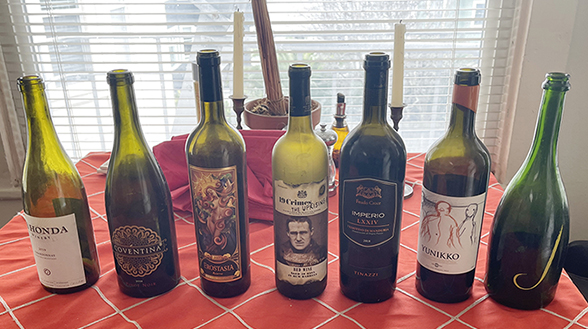Take a load off Fanny
Take a load for free
Take a load off Fanny
And (and) (and) you put the load right on me
Some twelve years ago, Your West Coast Oenophile coined the name Sostevinobile, a portmanteau from the Italian terms for sustainable + noble + wine. Among its myriad deleterious effects, the wondrous COVID-19 pandemic has reduced my opportunities for discovering and reviewing new wines to a paucity. As such, let me veer the focus of this blog toward the less-frequently cited cornerstone of my ongoing effort, our dedication to sustainability.
As I will note in my next post, certain criteria for sustainability have evolved over the past dozen years, while the urgency of reducing our carbon footprint has only become more acute. Which should lead producers to explore all avenues for limiting the environmental impact of their viticultural practices. Certain practices, like monitoring power consumption, reclaiming water, or eschewing non-biodegradable materials like Styrofoam should be no-brainers that pose any compromise to the potential quality of their wine. Others may have minimal æsthetic impact but offer significant savings, both monetary and environmental.
As with screwcaps, there is a perception that lighter bottles = a cheaper product. In 2021, there is no longer any basios for the presumption that a heavy glass bottle is the mark of a superior wine. As a judge for last year’s US Wine Ratings competition, I was startled by the sheer weight of one of the bottles I had to sample and evaluate, so I put together a random lineup and propped each onto my kitchen scale.

The weights of these seven bottles varied widely, with a range of 22.54 oz (1.41 lbs):
La Honda = 21.20 oz
Coventina = 31.11 oz
Erostasia = 24.80 oz
19 Crimes = 19.93 oz
Imperio = 42.47 oz
Yuniko = 29.07 oz
J = 31.08 oz
Granted, I found the lightweight glass of 19 Crimes almost flimsy, but the next lowest bottle, the La Honda seemed standard and still weighed less than half of the Imperio. Now, if I hadn’t had to forsake my gym and upper body routine during this dreary pandemic, I might not have felt so strained in pouring this ponderous Primitivo, but still its bottle seemed far more substantive than need be. But brachial strength does not address its impact on sustainability.
A 750 ml bottle of wine contains ~28 oz of wine by weight. The glass in several of these bottles surpassed that. Wine is typically shipped by the pallet, a tightly-wrapped stack of 56 cases, or 672 bottles. The liquid weight of this shipment is 1176 lbs., or more than half a ton. The variation in bottle weight means, however, that the heavier bottles add 947 lbs. to the overall weight of the pallet, a significant increase in their impact on the carbon footprint, as well as shipping costs.
Is the price of such vanity worth it?